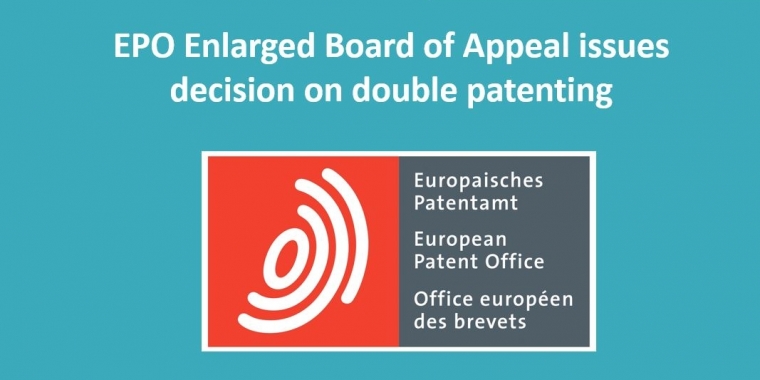Thu 1st Jul 2021
Double patenting can be refused by EPO for 'same subject matter' but not for 'similar' or 'overlapping’ claims
Services: IP strategy, Obtaining a patent, Opposing and defending a patent at the EPO, Patent application drafting and filing, Patents
Sectors:
On 22 June 2021, the Enlarged Board of Appeal of the European Patent Office (EPO) confirmed that a European patent application can be refused under Articles 97(2) and 125 EPC if it claims the same subject-matter as a European patent which has been granted to the same applicant. The Enlarged Board of Appeal is the highest authority at the EPO.

Confirmation of bar on double patenting
The principle of the prohibition on double patenting excludes two patents being granted to the same applicant for one invention and is applied in many countries. There had previously been some doubt about the existence of legal basis in the European Patent Convention for a refusal of a European patent application on the basis that the same applicant already has a granted European patent for the same subject matter.
This new decision by the Enlarged Board of Appeal now closes this question, confirming that an applicant cannot be granted two European patents for the same subject matter (“invention”).
https://www.epo.org/law-practice/case-law-appeals/communications/2021/20210622.html
Definition of ‘same subject matter’
The Enlarged Board of Appeal decision did not address the definition of “the same subject matter” as it decided that this was not part of the questions put to it to resolve and, in this case, the claims of the patent application and previous granted patent were identical in any event. This decision therefore does not necessitate a reconsideration of the narrow definition adopted by some EPO Technical Boards of Appeal in recent decisions.
According to the narrow definition of “same subject matter” adopted by EPO Technical Boards of Appeal in recent decisions, the fact that the claims of a pending application encompass subject matter of the claims of a granted patent to the same applicant is not sufficient for a “double-patenting” refusal of the application.
Some decisions by the EPO Technical Boards of Appeal that highlight the narrow definition of the “same subject matter” include the following two recent decisions.
- 2020 decision T0777/19 included the finding that “a mere overlap in scope, even if to a large extent, does not result in double patenting”. The invention related to a medical device for causing the hemostasis of a blood vessel for use through an endoscope. A j-hook couples a control wire to a clip having legs to close around and compress a bleeding blood vessel at a target site. The control wire is reversibly operable to open and close the legs of the clip via the j-hook. The finding of no “double patenting” between two claims referred to the fact that one of the two claims specified that the j-hook is formed at the end of the control wire whereas the other of the two claims did not.
- In 2014 decision T1780/12, it was decided that even very similar claims are not for the same subject matter if there is some difference in the scope that they afford. A purpose-limited process claim (“Swiss-type” claim) having the form “use of X for the manufacture of a medicament for the treatment of Y” and a purpose-limited product claim of the form “X for use in the treatment of Y” were found not to be for the same subject matter, on the basis that they afford different scopes of protection.
Implications for applicants
This provides opportunities for applicants as an objection for double-patenting will not have grounds if there are similar or overlapping, but not identical, claims.
For example, one could take advantage of a positive finding by an examiner for a narrow sub-claim in order to safeguard the grant of at least a relatively narrow European patent for an invention, while filing a divisional application to challenge for a broader patent for the invention.
How we can help
The patent attorneys at Page White Farrer are experienced at identifying the best strategic approach for each patent and are happy to discuss how to deal with double-patenting questions.
This briefing is for general information purposes only and should not be used as a substitute for legal advice relating to your particular circumstances. We can discuss specific issues and facts on an individual basis. Please note that the law may have changed since the day this was first published in August 2021.

